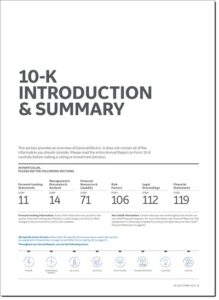 Jason Zweig, writing in the Wall Street Journal, discusses efforts to make securities disclosure more understandable to the typical investor. He quotes the Nobel-laureate behavioral economist Richard Thaler as saying that “nobody reads” the dense disclosure mandated by the SEC. This is clearly a bit of hyperbole, but I think we can all agree that a majority of investors don’t read a prospectus cover to cover before making their investment decision. The question is what to do about it.
Jason Zweig, writing in the Wall Street Journal, discusses efforts to make securities disclosure more understandable to the typical investor. He quotes the Nobel-laureate behavioral economist Richard Thaler as saying that “nobody reads” the dense disclosure mandated by the SEC. This is clearly a bit of hyperbole, but I think we can all agree that a majority of investors don’t read a prospectus cover to cover before making their investment decision. The question is what to do about it.
I do support efforts by the likes of Thaler to create a form of disclosure that can be understandable by most investors. However, we shouldn’t at the same time discard requirements that companies make detailed disclosure, even if most won’t read it, because some investors, journalists and securities regulators still will, and these efforts to understand companies can serve the broad public interest. The approach can be akin to the efforts of the Consumer Financial Protection Bureau to make loan documents more understandable, where they require a short and standardized table in front setting forth the key terms of the loan, though the documents keep the necessary boilerplate language on the subsequent pages. In other words, create an understandable form of securities disclosure, but don’t throw out the baby with the bathwater. In fairness to the SEC, there have been steps taken in this direction, for example by requiring a summary prospectus to appear up front. But in practice, those summaries are themselves pretty dense and not necessarily standardized.
Ironically, Professor Thaler himself makes a cameo appearance in the movie “The Big Short” (based on the Michael Lewis book), which itself is a sort of success story about securities disclosure. Our hero, hedge fund investor Michael Burry, discovers by researching disclosure about mortgage-backed securities that the whole industry was based on faulty assumptions and likely to crash. In one sense, there wasn’t a happy ending, because only Burry and a select few others who did their homework and resisted groupthink profited handsomely from the crash, while the majority of Americans suffered through a deep recession. On the other hand, the disclosure ultimately enabled the problematic nature of the housing market to be exposed, so the issues could be identified and rectified.